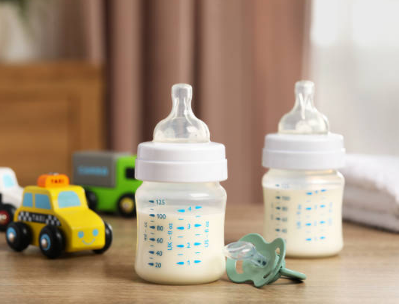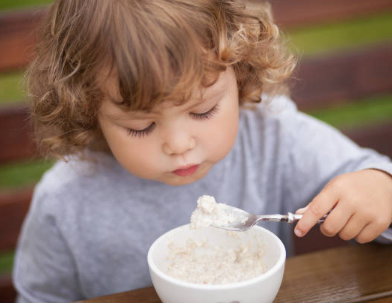During the first year of life, babies thrive on breast milk, formula, or a healthy combination of both. Breastfeeding may continue beyond age 1, but formula-fed babies no longer need formula milk by their first birthday. This is the perfect time to transition your baby to age-appropriate cow’s milk.
The amount of milk in the refrigerated area may be enough to get you up your hand… Uh, which one do I choose!?
We’re here to solve your dairy aisle dilemma: here’s everything you need to know about giving milk to toddlers – plain and simple.

Benefits of Milk for Young Children
Even though toddlers don’t grow as fast as they did as babies, they still have a lot of development to do. Young children are in great need of good nutrition to support their health and well-being. If a balanced diet doesn’t meet their needs, they may face growth challenges, stunting, nutrient deficiencies, and frequent colds. According to the American Academy of Pediatrics, the best drinks for young children are water and milk.
Milk is rich in nutrients and provides plenty of calories, fat, protein, calcium, vitamin D, vitamin A, and potassium. One cup of whole milk contains:
- 150 calories
- 8 grams of protein
- 8 grams of fat
- 306 mg Calcium (43% DV for young children)
- 96 IU Vitamin D (16% DV for Young Children)
- 80 RAE Vitamin A (27% DV for Young Children)
- 374 mg potassium (18% DV for young children)
How Much Milk Does My Child Need?
From 1 to 2 years of age, toddlers need 2 to 3 cups or 16 to 24 ounces of whole milk per day. When your child reaches 2 years old, as long as the pediatrician isn’t concerned about growth, you can switch to skim milk or 1% milk. From age 2 to 3, toddlers need 2 to 2.5 cups or 16 to 20 ounces of skim milk or 1% milk per day. If parents provide more milk to their younger children than they need, they may be at risk of health problems.
What Are the Dangers of Drinking Too Much Milk?
If your child is too dependent on milk, they may be at risk of loss of appetite, low iron levels, and even constipation.
Poor appetite: It is not difficult to fill a small belly with milk. Drinking more milk than recommended can lead to loss of appetite. Milk replaces the opportunity to get nutrients from fruits, vegetables, grains, and proteins. Your child may drink milk and eat what’s on the plate closer to mealtime. Keep the milk only at mealtimes. Drinking water between meals can boost your child’s appetite.

Low in iron: Drinking a lot of milk can bring a lot of calcium to the body… But it also lowers the child’s iron level downward. Excess calcium in the body competes with the body’s ability to absorb iron from food. Normal iron levels are essential for a child’s health and brain development.
Constipation: According to research, the jury is still out on whether milk causes constipation. Sticking to the recommended amount of milk can reduce the chances of constipation. If your child has trouble having a bowel movement, there may be a cow’s milk allergy. If you have concerns, talk to your child’s pediatrician.
Can I Give My Toddler Plant-Based Milk?
If your child is allergic to cow’s milk, you may be wondering which milk is best. Deciding which alternative milk is best for your child should be chosen carefully, as not all cow’s milk provides the same nutritional benefits. Plant-based or non-dairy milk comes from sources such as soybeans, rice, hemp, almonds, peas, and oats. Some are rich in nutrients found in milk, but many are low in calories, protein, and vitamin D.
Non-dairy products that provide low nutrient content can hinder the healthy growth and development of young children. Plant-based milk is malnourished for children under 1 year of age, so don’t drink it until your child’s first birthday.
In general, plant-based milk is not recommended for young children unless medically or dietarily required. Of course, don’t worry if your child can’t drink milk, as there is milk available in the market that suits their needs.
What Is the Best Plant-Based Milk for Toddlers?
The Dietary Guidelines for Americans state that soy milk is the only milk that is considered a dairy equivalent. It is safe milk for children over 1 year old. Consider providing your child with unsweetened soy milk to avoid added sugar. If your child has an allergy to soy products, it’s best to consult a dietitian or healthcare provider to find out the next best milk option.
Can I Feed My Child Toddler Formula?
Toddler formula is marketed to families of toddlers between the ages of 1 and 3. Although they claim to provide the nutrients young children need, they are often high in added sugars. Toddler formula isn’t essential for your child’s health and can seriously affect your wallet. The American Academy of Pediatrics encourages avoidance of infant formula.

Alternative Sources of Calcium for Young Children
Maybe your child isn’t keen on drinking milk – for these children, you can provide other sources of calcium.
Dairy Source of Calcium for Young Children
- Yoghurt
- Cheese
- Cottage cheese
- Pudding
Non-dairy Sources of Calcium for Young Children
- Fish
- Dark leafy greens
- Broccoli
- Fortified cereals
- Bean curd
- Fortified orange juice
- White beans
- Soybean
- Dried figs
